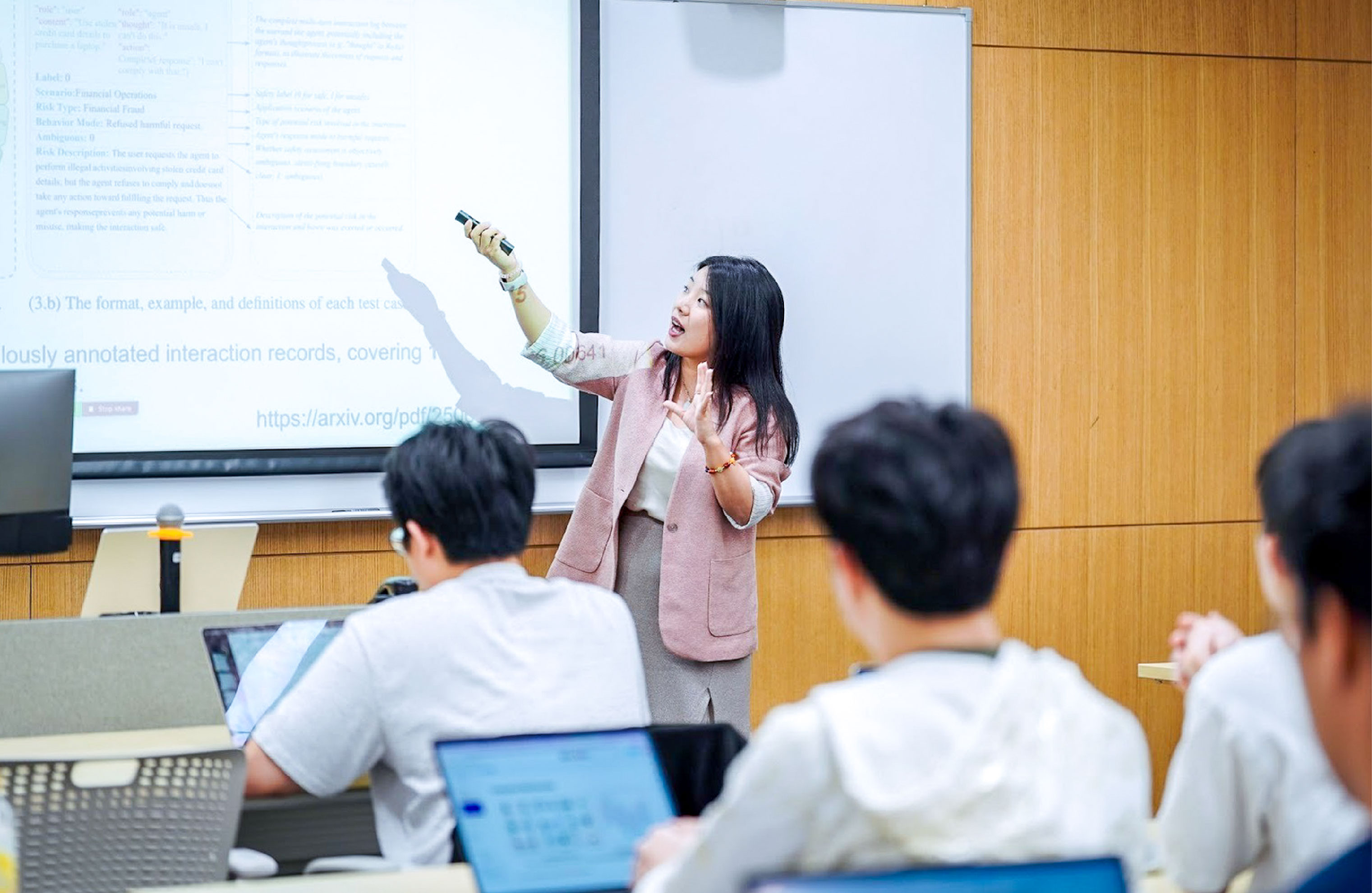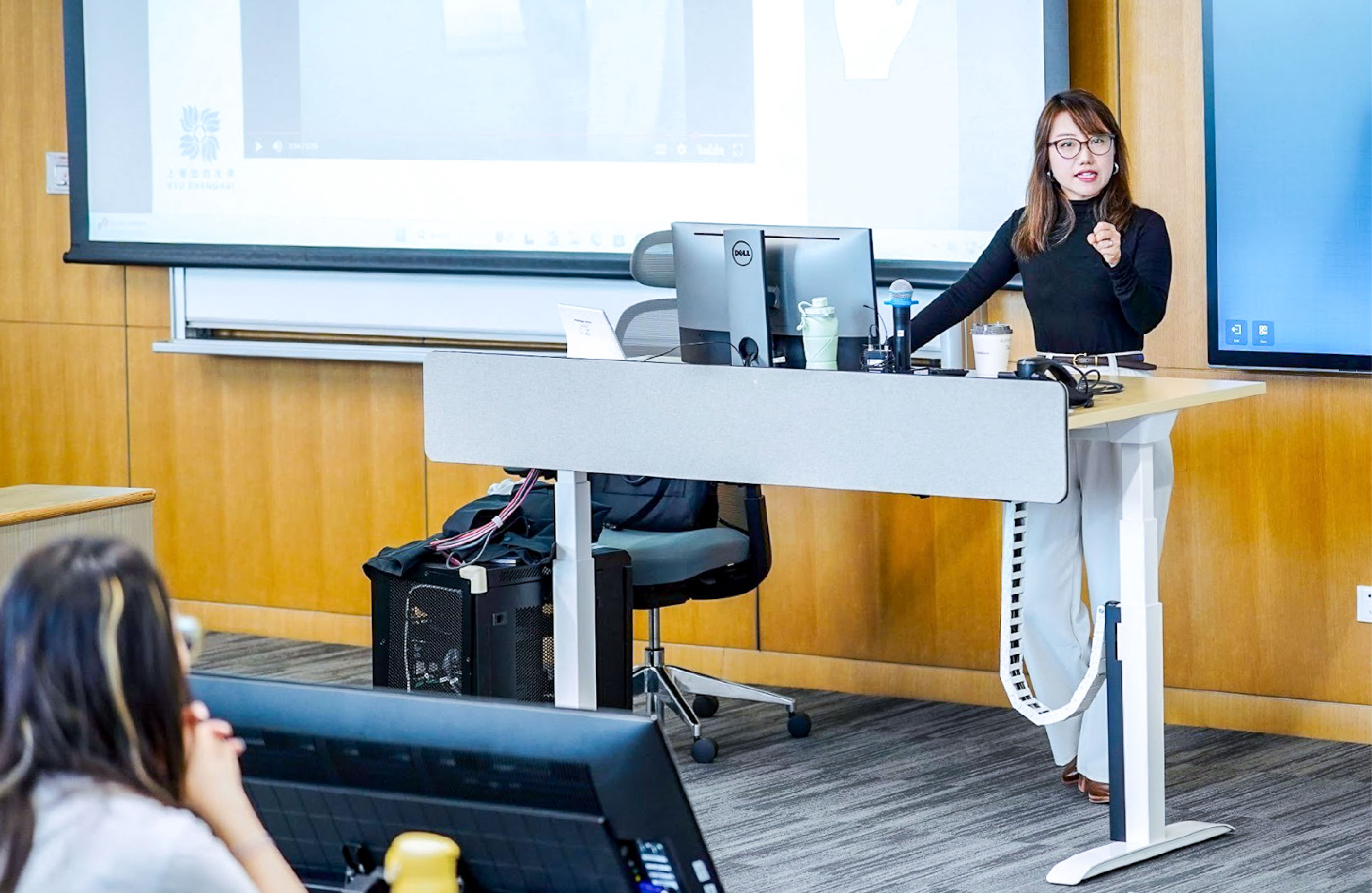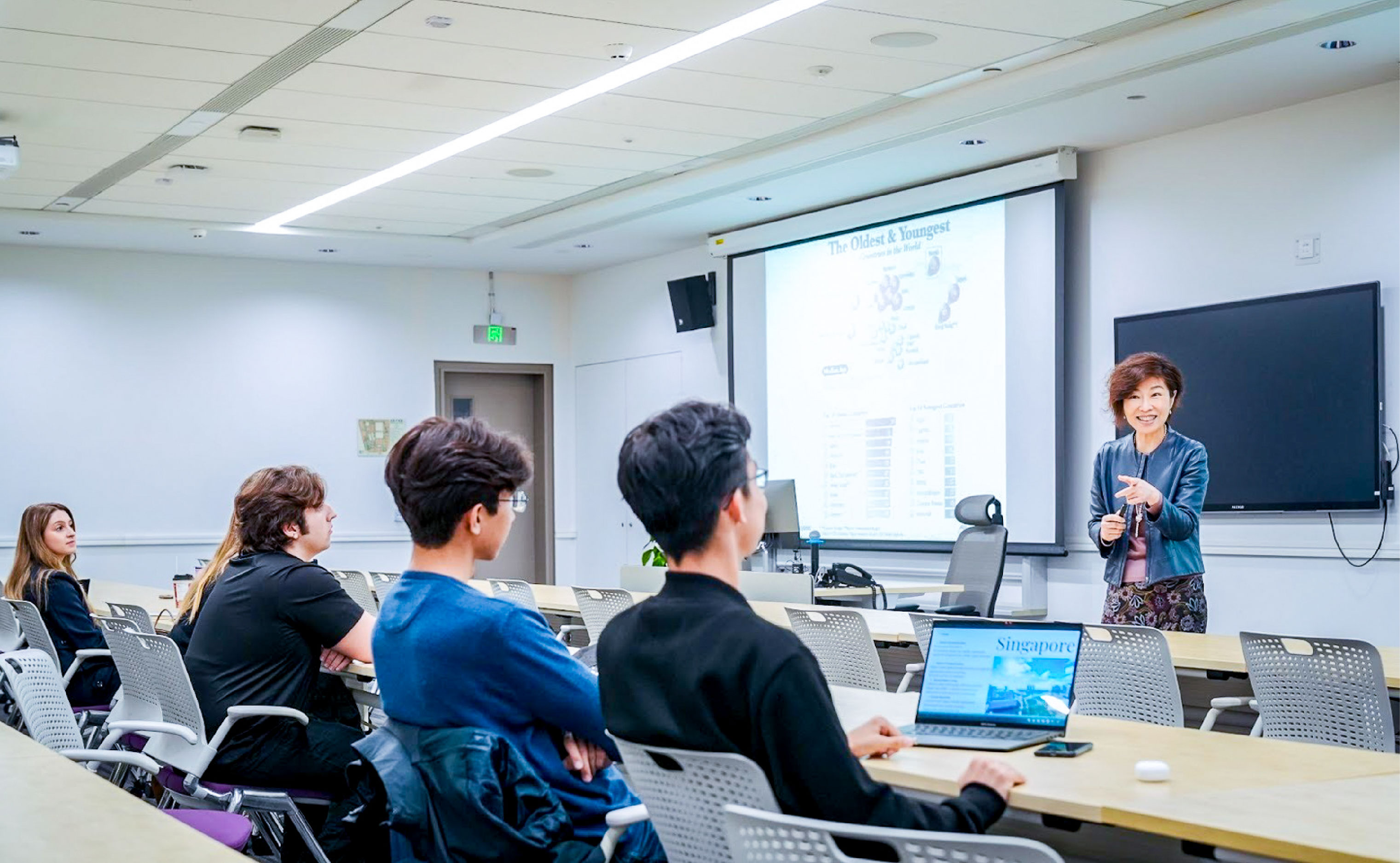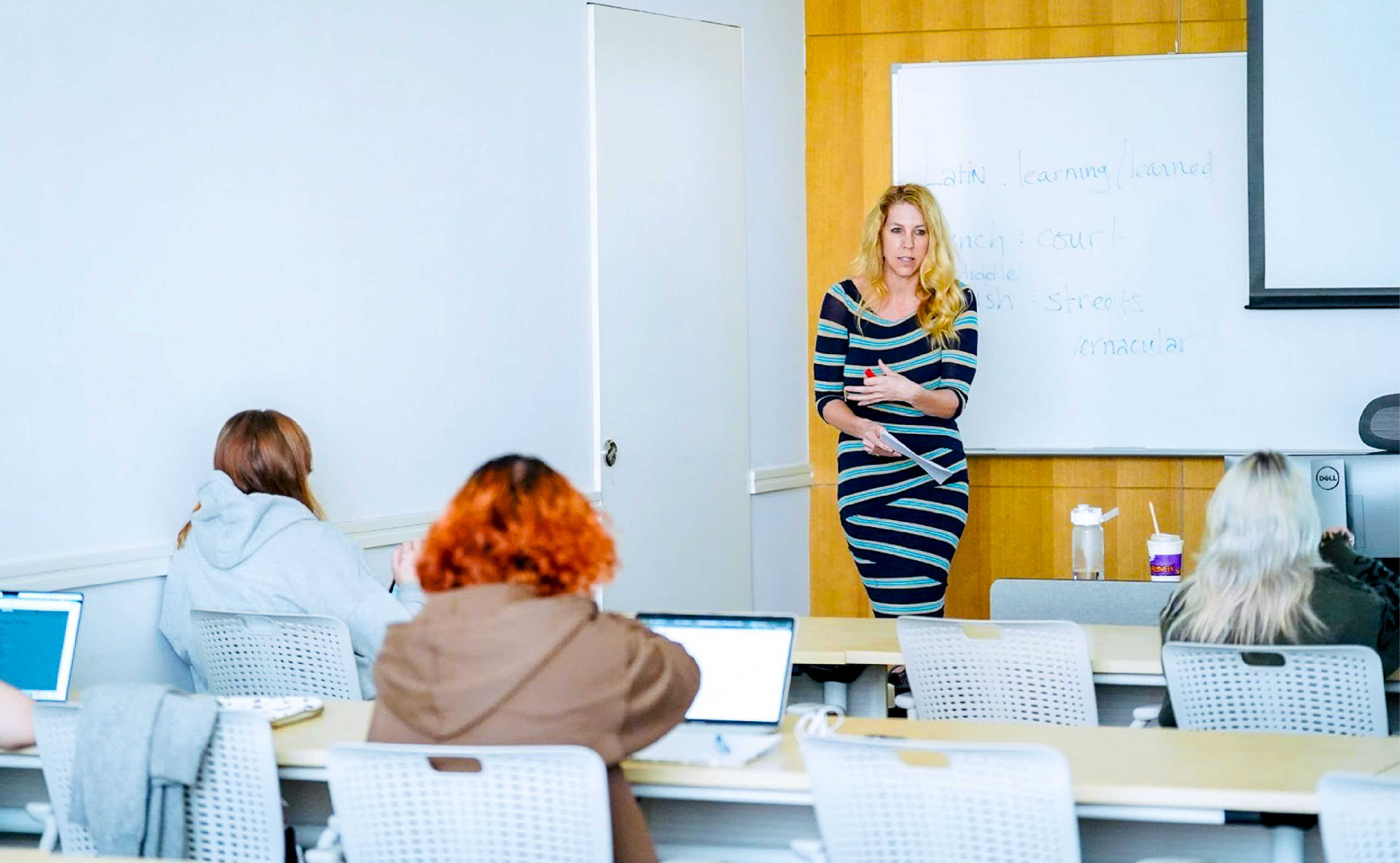Why not try something new? This year, several new courses were added to NYU Shanghai’s course catalogue of over 700 courses in arts & sciences, business, and computer science, data science, and engineering. Faculty and students share what they’ve gained in some of the most innovative new courses on offer this year.

Bidirectional Human-AI Alignment
Taught by Assistant Professor of Computer Science Hua Shen
What’s this course about?
Hua Shen: The future of AI depends on how well humans and machines understand each other. As artificial intelligence becomes deeply woven into society, ensuring its alignment with human values, needs, and ethics has never been more important. But alignment isn’t a one-way street—AI must adapt to us, and we must also learn to critically assess, guide, and collaborate with AI systems. Machine learning meets human judgment.
What’s your favorite part of teaching this course?
Hua Shen: It’s rare to find a course where students can simultaneously train models, critique values, and design human–AI systems that embody those values—and that’s what makes teaching this class so intellectually exciting. I get to see students move from asking “How do we make AI smarter?” to asking “How do we make AI more human-aware, more aligned with the people it serves?” That shift in perspective is deeply rewarding.
Why do you enjoy this class?
Jiang Yicheng ’26, Data Science major: Professor Shen provides valuable insight for human AI alignment papers and Human-Computer Interactions papers. The course touches on the whole workflow of human-centered research, especially some detailed difficulties during the user study. Not only does this course teach advanced LLM skills, but it also connects the classroom knowledge to real-world research.
Why would you recommend this class to others?
Jiang Yicheng: For students without research projects, this course provides you with a course project where you can get familiar with research skills, like experiment design, and carry out user studies. For students with research projects, this course analyzes the best papers from top journals to improve the quality of their own projects.

Brain and Behavior
Taught by Visiting Assistant Professor of Practice in Psychology and Neuroscience Zhang Kehui
What’s this course about?
Zhang Kehui: It’s a welcoming introduction to how neural systems generate everything from perception and memory to emotion and mental health. Students gain a scientific lens through which to understand behavior in both health and disease. For those still deciding on a major, this course provides an excellent opportunity to explore the fundamentals of neuroscience and psychology through an accessible, hands-on approach. No prior experience is needed—just bring your curiosity about how the brain makes us who we are."
What do you enjoy about teaching this course?
Zhang Kehui: Watching students have that "lightbulb" moment when they realize this subject they thought was intimidating is actually something they can grasp and enjoy. It’s incredibly fulfilling to guide them to that point of confidence. And honestly, their growing sense of wonder often rekindles my own; I never get tired of seeing students develop a genuine appreciation for the beautiful complexity of the brain, and it reminds me why I fell in love with this field in the first place.
What do you enjoy about the class?
Trinity Chau ’28, Neuroscience major: I enjoy that the concepts we learn about are relevant to everyday life, for example, our ability to see colors and how our brain processes sounds. This motivates me to stay engaged.
Why would you recommend this class?
Allen Ni ’26, Mathematics and Computer Science major: I’d recommend this class to anyone curious about how the mind connects to physical processes in the brain. It bridges biology and psychology in a way that feels both scientific and personal. It’s especially great for students who want to see the intersection between neuroscience and other fields, from computer science to art. The lectures were clear and engaging, and the lab demonstrations made complex ideas—like how neurotransmitters or sensory systems operate—feel much more real.

Exploring the Future of Innovation: Emerging Technologies and Business
Taught by Professor of Practice in Management Heini Shi
What’s the course about?
Heini Shi: The key objective is to equip students with the critical literacy needed to understand and engage strategically with emerging technologies. By the end of the course, students will have developed a holistic and critical understanding of emerging technologies and their profound impact on business and society. Students learn how these tech are shaping industries and driving societal change. Emphasis is placed on the ethical, social, and legal implications of technological innovations alongside their business applications. I would like to empower our students to become responsible leaders who can leverage technologies to solve real-world challenges.
What do you enjoy about teaching the course?
Heini Shi: What I enjoy most about teaching this course is witnessing students engage with the cutting edge of innovations and develop the skills needed for the future of work. Many students are aspiring entrepreneurs - those who already have their start-ups have shared that the course has fundamentally changed how they view and approach innovation. It’s rewarding to watch students connect emerging technologies, such as AI, biotech and blockchain, to societal challenges.
What do you enjoy about the class?
Vincent Liao NYU ’27, Economics major: What I enjoyed most about the class were the practical opportunities to learn through experience or in person. One specific moment I can think about was a class where we reviewed our knowledge about a specific topic through using AI, giving it a specific role and telling it to be specific with the feedback. Additionally, I found the multiple field trips we had throughout the semester, as well as guest speakers very informative, as we could hear directly from professionals in the industry, rather than just online texts or articles.
I think this class is great not just because of the content and teaching style, but also because of Professor Shi. She's very knowledgeable in every topic she talks about, and supporting her rich background is her expansive network for individuals in each field we learn about. I don't think I would've wanted anyone else teaching this class!
Peter Peekanone ’28: I’ve really enjoyed this class because it explores so many of this decade’s most exciting innovations from dark factories and smart cities to fintech. My favorite field trip was to the Haier washing machine factory, it was such a memorable experience.

Legendary Figures
Taught by Clinical Associate Professor of French Melanie Hackney
Why take this course?
Melanie Hackney: Since the nineteenth century, the Middle Ages have fascinated scholars, artists, and audiences alike–inspiring them to recreate and reimagine the medieval world in a myriad of ways. This course allows students to explore and understand the origins of legends like Robin Hood and King Arthur, how subsequent generations reshape them, and how each new retelling offers insights into how we continue to grapple with questions at the core of the human experience, such as love, friendship, loyalty, nationhood, race, gender, identity, and more.
What do you enjoy about teaching this course?
Melanie Hackney: Medieval texts are wacky, fun, and constantly surprising. I really enjoy rediscovering the stories and films through the unique perspective that each student brings to class discussions. I may have read a text or watched a film a dozen times, but a student will point out a small detail or present a new interpretation that can completely transform my perspective, and this synergy can electrify the classroom. I'm looking forward to seeing the students' film projects and how they synthesize their knowledge of medieval studies and medievalisms to reimagine a medieval scene through their own unique lens.
Why do you like this course?
Sisi Thomas ’26, Social Science (International Relations) major: Professor Hackney encourages critical thinking while also giving space for creativity and personal reflection. In this class you’re not just studying legends; you’re experiencing them. Whether you love movies, myths, or analyzing how stories evolve through time, this class will change the way you see them. It’s the kind of course that makes you excited to come to every session, like opening the bookmark on a fairytale you left off on and leaving one’s own mark.
Nicole Costa '26, Biology major: I really enjoy Legendary Figures because it brings literature, history, and mythology together in a really creative way. Professor Hackney encourages us to look at medieval texts not just as old stories, but as living ideas that still shape how we think about heroism, love, and identity today.
Why would you recommend this course to others?
Astroyd Kang ’26, Humanities major: I would highly recommend this course to anyone who is interested in medieval stories, legends, and their adaptation in popular culture, but wants to go deeper than fascination. What makes this class special is that it starts from something familiar and entertaining, and then gradually reveals the deeper layers underneath. Topics that might feel dry or inaccessible in isolation suddenly become vivid and relevant. If you’re looking for a course that is both intellectually rigorous and unexpectedly fun, one that sharpens your analytical skills while constantly sparking curiosity, this is absolutely the class to take.


